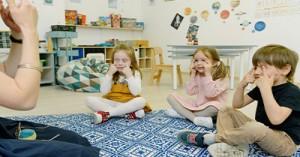Working as a childcare professional enables you to interact with children, their families, co-workers and sometimes childcare specialists. It is important to maintain open and honest communication with all those involved at your centre and to establish comfortable relationships with the families, co-workers and specialists you are dealing with.
There is a great importance to build positive relationships in childcare but where do you begin? On researching on this topic, you will find that there are a lot of detailed information available covering the various aspects on working in collaboration with families and co-workers in a childcare setting. This article will provide you with the most practical and useful strategies you can easily implement in your centre, to begin building positive relationships with families, co-workers and specialists in order to work together in building partnerships between childcare professionals and parents.
Building Positive Relationships with Families
By collaborating and establishing positive relationships with families, this will enable you to gain parent trust and respect as you interact with their child. Parents will feel comfortable in talking to you about any issues and concerns they may have about their child and accept your professional opinion. Another important factor to remember when building relationships with families is that they will actively participate in any events or experiences in your centre and become more involved in the programming and planning.
Below are a few helpful tips to help build positive relationships with families:
- Create a welcoming atmosphere – It's important to allow family members to participate freely in the center's activities. Invite family members to ask questions and to explore the centre. You can provide explanations about the activities and how they link to the program. Show the family member different projects that their child has participated in and any displays such as art that the child may have worked on.
- Have open communication – It's so important for you to be having an open communication with parents about their children's developmental needs. Parents have a right to know what is happening with their child so if you have any behavioral issues or concerns with a child, talk to their parents. At times, it may seem like parents don't take the time to communicate with us. However it's our responsibility to build up the lines of communication. This can include: newsletters, personalized notes, child communication books, questionnaires, surveys, suggestion boxes etc.
- Create a room notice board – This will allow you to share experiences and messages with families on a daily basis. You can add the weekly program, daily photos, children's birthdays, child / parent input of the program, newsletters and any messages or important information that you can share with the families at the centre. Just remember that this will be seen by all families, so only provide general information that will benefit all families.
- Arrange a calendar of family events – During the beginning of the year, it's beneficial to provide each family with a calendar of family events which are held throughout the year as well as lots of reminders closer to the “special day”. This allows families advance notice for family days and encourages everyone to be involved. This also helps full time working parents in participating in centre events by providing plenty of time to rearrange their work schedules. Some centre events can include: mother's day afternoon tea picnic, father's day barbecue, disco night, parent information nights, parent and teacher social nights, end of year concerts etc. You can also add to your calendar special visitors (like, Reptile Man) or excursions (to The Zoo) that have been booked and prepared for the children and families in advance.
- Encourage parent input into the Program and Planning – When parent's talk to you about events that take place in their child's lives, it's important to acknowledge it and to try add it to the program as parent input. For example, if Sammy's mum told you that Sammy's older sister is going overseas to Spain, you can add it in the program as parent input. This is relevant to the program as you can teach the children about Spain. The parents will begin to realize that they are contributing to their child's development, which in turn will create a better understanding of the weekly program and its purpose. Parents will feel comfortable offering their suggestions and input for the program, which builds a teaching partnership between childcare professionals and parents.
- Hold social events for childcare professionals and parents – This event is about getting together, letting your hair down and getting to know the families at your centre, without any of the children. You can create a theme night such as “Xmas in July” that will be held in your centre, one evening. All staff and families (only grown-ups!) are invited to spend some time getting to know each other. This event is very successful as parents and childcare staff begins to get to know each other which breaks down the barrier between childcare staff and parents.
Building Positive Relationships with Work Colleagues
By building positive relationships with colleagues, it creates a caring and supporting environment for the children to be a part of. In child care, we are working as part of a team in caring for children and it’s important that we work together and in mutual respect for one another. Each of us is our own individual but regardless of our likes and dislikes it's vital that we collaborate with each other while working together.
Below are a few helpful tips to help build positive relationships with colleagues:
- Listen and acknowledge ideas and feedback – No matter how many years you have been working in this industry, there are always different ideas and suggestions that our co-workers may have. It's so important to discuss any issues or concerns about programming, behavioral challenges, activities etc with your co-workers. You will be surprised at the different suggestions you could try that you haven't heard of.
- Offer help when needed – If you find that a co-worker is struggling to deal with a situation, like a crying child or a screaming child, offer your help. Just an extra hand will help get the situation under control.
- Encourage honest and open communication – It is vital that all staffs are open and honest when working in childcare. It's best that all staffing issues are dealt with directly and promptly. All staff should feel comfortable about discussing their issues and concerns with one another without feeling intimidated.
- Offer support and advice – At times fellow staff will need support when dealing with a parent or need useful advice on a certain topic. It's important to collaborate with one another and support each other in such circumstances.
- Have work parties / outings – To help get to know fellow workers it's a good idea to have work parties. They can be as simple as a drink at the pub after work to eating out at a restaurant. This gives you all an opportunity to bring out everyone's personality and socialize together in a different environment.
Sometimes little differences and misunderstanding do divide a team while working in a childcare centre. It's vital to deal and confront any issues surrounding child care workers. Not only does these issues bring team morale down but also creates an unwelcome environment for both children at the centre and fellow childcare professionals.
Remember that the foundation in building relationships is to provide clear and open communication as well as a comfortable environment for parents and childcare professionals to collaborate together.







 As an Educator in Australia, your pay rate falls under the Children’s Services Award 2010. This award states the minimum amount that an employer can
As an Educator in Australia, your pay rate falls under the Children’s Services Award 2010. This award states the minimum amount that an employer can When working as a qualified Early Childhood Teacher (with a university degree) within a service, your rate of pay will come from the Educational Services
When working as a qualified Early Childhood Teacher (with a university degree) within a service, your rate of pay will come from the Educational Services When working as a Diploma Qualified Educator your pay rate is from the Children's Services Award 2010. This Award states your minimum rate of pay
When working as a Diploma Qualified Educator your pay rate is from the Children's Services Award 2010. This Award states your minimum rate of pay When working as a Cert 3 Qualified Educator, your pay rate is from the Children's Services Award 2010. This Award states your minimum rate of
When working as a Cert 3 Qualified Educator, your pay rate is from the Children's Services Award 2010. This Award states your minimum rate of Educational Leaders play a crucial role in their early childhood service by ensuring that the educational program aligns with best practices and supports the holistic
Educational Leaders play a crucial role in their early childhood service by ensuring that the educational program aligns with best practices and supports the holistic In early childhood education and care, ratios are more than a technicality—they are a frontline safeguard. Every child deserves responsive supervision, emotional connection, and developmental
In early childhood education and care, ratios are more than a technicality—they are a frontline safeguard. Every child deserves responsive supervision, emotional connection, and developmental With the new national child safety reforms kicking in on 1 September 2025, early childhood services like yours have a real opportunity to lead the
With the new national child safety reforms kicking in on 1 September 2025, early childhood services like yours have a real opportunity to lead the Here’s a comprehensive Mobile Phone and Smart Watch Policy tailored for early childhood education and care (ECEC) services in Australia, aligned with the latest 2025
Here’s a comprehensive Mobile Phone and Smart Watch Policy tailored for early childhood education and care (ECEC) services in Australia, aligned with the latest 2025 The Sea of Fish Challenge is a national initiative that invites children, educators, families, and communities to create and display fish artworks as a symbol
The Sea of Fish Challenge is a national initiative that invites children, educators, families, and communities to create and display fish artworks as a symbol Across the early childhood education and care sector, educators are sounding the alarm: current staffing ratios are insufficient to deliver safe, meaningful, and developmentally appropriate
Across the early childhood education and care sector, educators are sounding the alarm: current staffing ratios are insufficient to deliver safe, meaningful, and developmentally appropriate


